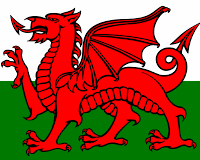Copyright

Y ddraig goch dyry ychwyn! bearing only the remotest resemblance to Scotch Whist. The fact that Tens are significant reflects an eighteenth-century name for the ten of trumps at Whist, where it was sometimes referred to as "the Welsh honour".
- Cards
- Shuffle two full packs together. They needn't have matching backs. Add at least four Jokers, and more if you have them.
- Object
- To win cards, especially Tens and Taffies. (Taffies are Welsh Jokers; but ordinary ones will do.)
- Rank of cards
- Cards rank AKQJT98765432 in each suit. A Taffy counts as the 10½ of any suit. In other words, it ranks between Ten and Jack for trick-taking purposes.
- Deal
- None. Just put the pack face down where everyone can reach it.
- Play
- At each turn you either draw the top card of the stock and add it to your hand, or, from your second turn
on, lead any card face up to a trick. Whenever a trick is led, everyone else in turn must, if possible, follow suit to the
card led. If you hold a Taffy you can always follow suit because it counts by definition as the 10½
of that suit. If you can't follow suit or play a Taffy, you must pass. A trick may therefore contain from one to as
many cards as there are players. If you lead a Taffy you must state what suit it represents.
The trick is taken by the highest card played, or by the first played of equally highest cards. Upon winning a trick you place it face down on a pile of won cards in front of you. You needn't bother to keep them separate as tricks.
You do not then lead to the next trick, unlike in other games. Instead, the turn to play passes to the left of the player who led to the trick.
The fact you don't all have the same number of cards in your hands at any given time doesn't matter. On the contrary, it adds to the fun. - Ending
- When the stock runs out you can no longer draw, so at each turn you must lead to a trick so long as you have any cards left. As players run out of cards they drop out of play. The last player left with cards in hand simply adds them to their winnings pile.
- Scoring
- You each score 10 points for each Taffy and Ten in your winnings pile, and one point for every other card. The total number of points distributed among the players will be 216 if there were four Taffies in play.
- Optional extra
- If you don't mind a lot of counting, deduct 5 points for each Five taken in tricks, instead of counting 1 point. This reduces the overall total to 178 (assuming four Taffies).
- Simpler scoring
- If you do mind a lot of counting you can do it this way instead: Players stack their won cards neatly and compare the heights of their piles. Whoever has the smallest pile scores one point for each Ten and Taffy captured. Whoever has the next higher pile scores twice the number of Taffies and Tens won, the next higher three times the number won, and so, if more play, on.
- Cheating
- The trouble with this game is that it is easy to cheat by claiming you can't follow suit when you can.
Personally, I prefer it when everyone plays honestly. Nevertheless, I regard unpoliceable cheating as a flaw in any game,
and therefore offer the following (geddit?) rule:
If anyone passes when you lead to a trick you may challenge them to prove their honesty. They must then show you their entire hand of cards (though not to anyone else, if it can be avoided). If in fact they have a Taffy or a card of the suit led, you take their entire hand of cards and add it to your own. If not, they similarly take yours and add it to their hand instead.
(I invented Welsh Whist nearly 60 years ago and have long since given up trying to think up a more elegant solution to this problem.) - Footnote: the Welsh Honour
- "The volumes of the Gentleman's Magazine during the last twenty years of the eighteenth century are full of these forgotten beliefs. Among card-players throughout England the ten in trumps is still called the fifth honour. A century ago (ibid., 1791, Part I., p, 16) it was dubbed 'the Welsh honour,' an expression which may be taken, according to the desire of the reader, as a compliment or an insult to that gallant little principality." (William Prideaux Courtney, English Whist and English Whist Players, 1894.)